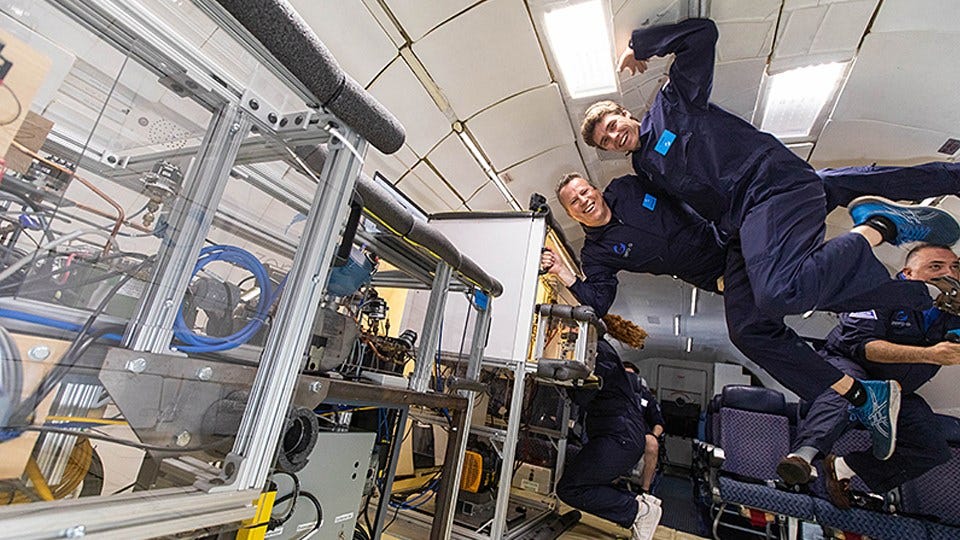Purdue Seeks to Give Astronauts Better Food in Space
 Eckhard Groll and Leon Brendel prepare to collect data from their experiments onboard a ZERO-G flight. (Photo courtesy: Stephen Boxall/ZERO-G)
Eckhard Groll and Leon Brendel prepare to collect data from their experiments onboard a ZERO-G flight. (Photo courtesy: Stephen Boxall/ZERO-G)
Subscriber Benefit
As a subscriber you can listen to articles at work, in the car, or while you work out. Subscribe NowA team of engineers from Purdue University is conducting experiments on a prototype refrigerator that could help astronauts on a long mission to Mars have better food, and not rely on freeze-dried meals. Purdue says even though fridge experiments have been in space before, they either did not work very well or broke down.
The team’s project, which is funded by NASA’s Small Business Innovation Research program, aims to give astronauts a supply of food that could last five to six years.
“The team is just trying to get a fridge into space and make sure that it reliably works. Reliability is maybe the keyword here,” said Leon Brendel, a Purdue Ph.D. student in mechanical engineering and a member of the research team. “If you send people to Mars with that fridge cooling their food, you want to be sure it works until it arrives on Mars, ideally even on the way back. Because you cannot call the technician on the way to Mars and get it fixed.”
The team, which includes engineers from Michigan-based appliance maker Whirlpool Inc. (NYSE: WHR) and Colorado-based Air Squared Inc., created a microwave-sized fridge that operates with an oil-free compressor. Conventional refrigerators, like those on Earth, rely on a compressor and gravity, but they can leak oil.
“We want to have a refrigeration cycle that is resistant to zero gravity and works to normal specifications,” said Eckhard Groll, a professor and head of Purdue’s School of Mechanical Engineering.
Earlier this month, Groll, Brendel and the team ran three experiments on various aspects of the fridge design onboard a specially designed plane that simulates zero gravity.
The plane, casually referred to as the “Vomit Comet,” makes steep declines and inclines, creating a sense of weightlessness in space.
Brendel says they had the opportunity to test the system during 30, twenty-second long, stomach-churning parabolas.
“The fact that the refrigeration cycles operated continuously in microgravity during the tests without any apparent problems indicates that our design is a very good start,” said Brendel. “Our first impression is that microgravity does not alter the cycle in ways that we were not aware of when we tested the effects of gravity on the fridge design on the ground by rotating and inclining it.”
While the long-term goal is to find a frig that can work on a mission to Mars or for a lunar station on the Moon, Brendel says the team has submitted a proposal to place a refrigerator on the International Space Station.
“Then we would get the real deal, long-term microgravity conditions, which would be excellent for us because we could test our system. And it would be great for the International Space Station because they would have some more cold storage space available,” said Brendel.
The research focuses on the technical aspect of refrigeration, but Brendel says an underlying message is to find a way to give astronauts better food which can be a morale-booster in space.
“If they only get freeze-dried fruit, drinks, calories from a bag, it’s just no fun if you have to do that for one to three years on a journey to Mars,” said Brendel. “If you had some fresh food, maybe from a refrigerator or actually from a freezer, that could improve the food situation a lot.”
Brendel said the system could have uses on Earth as well.
Leon Brendel, a Purdue Ph.D. student in mechanical engineering and a member of the research team, said fresh food is a key factor in the morale of astronauts.
